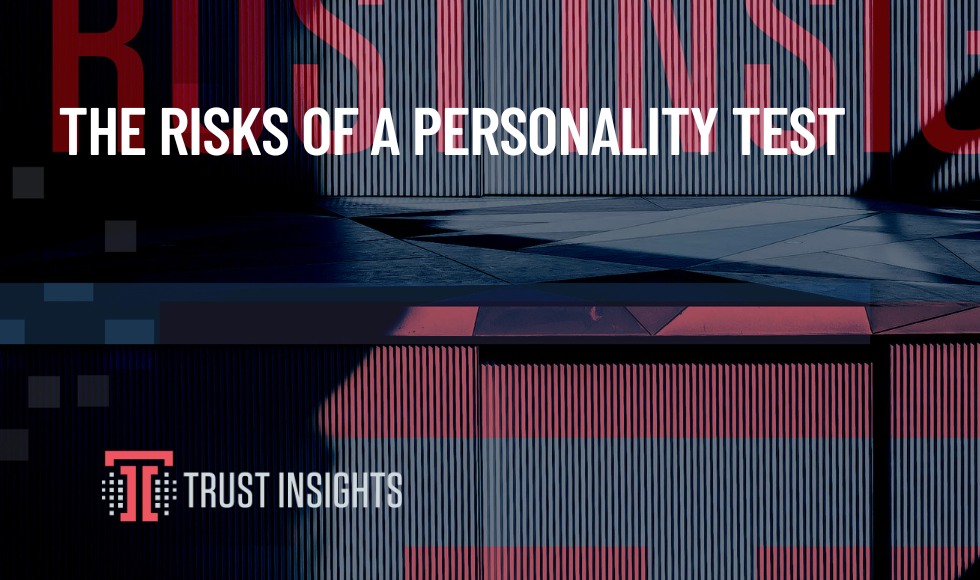This content was originally features in our February 22, 2023 newsletter found here: https://www.trustinsights.ai/blog/2023/02/inbox-insights-february-22-2023-personality-tests-purchase-frequency-analysis/.
Do you know yourself well enough to say what your personality type is? Maybe a better question is asking whether or not you’ve ever taken a personality test, or used one to make decisions about your team.
If you answered yes to any of the above – congratulations! You’re normal!
Here’s the thing. A personality test can be fun, a light weight ice breaker, or a team bonding exercise.
However, there are a lot of risks with putting too much stock in a personality test.
Responder Bias
Whether we realize it or not, we don’t answer a personality test honestly. Well, not completely honestly. We all have an idea of who we think we are, or how we want others to see us. When we’re responding to a personality test we’re responding with the answers that will give us a desired outcome. If we see ourselves as leaders, we tend to respond in a way we think a leader would. If we see ourselves as introverts, we lean toward the answers that are more inward facing.
Assumptions
I can tell you that I’ve gotten INTJ on the Myers-Briggs test or that I identify as a Type A. But this won’t even scratch the surface of who I am. The risk with using these labels is that they are limiting. If I am truly an INTJ, then as an introvert I would struggle to lead, speak up, and get on stage. If I am truly Type A, then why am I also really good at laying on my couch and doing nothing for two days straight.
Stereotyping
Very similar to assumptions, once you “know” someones personality type there is a tendency to put that person into a box and never let them out. The little bit of me that people know publicly is only a small piece of who I am as a whole. If I give a talk about Google Analytics twice, then I become the person that only gets to talk about Google Analytics. The same is true when we try to use personality test to assess people. If I’m labeled an introvert, I could lose out on opportunities where someone is looking for an extrovert.
Incomplete data
It should go without saying that if you can access a personality test without paying for it, you’re not getting something that would hold up in court. Ok, you probably don’t need to bring a personality test to court, but you will run the risk of judging and being judged based on the data produced. A personality test doesn’t take a lot of aspects of who you are as a person, or what you’ve experienced, into consideration. Most tests will ask opinions and preferences on made up scenarios. This means it’s only going to give you surface level feedback – not an accurate assessment.
But don’t just take my word for it. Here is what our community had to say about the topic:
“They’re fun to take, but hard to turn into action. And the danger is you make a snap judgment about what “type” a person is, then stop listening to them and just try to manipulate them based on their type. I’ve learned it’s much more important is just to listen to people, ask them what they want, and if they don’t know probe gently to find out more. Everyone is different, no one fits neatly into personality tests, and many of those tests aren’t even based in science.”
“They are based on junk science, putting on my psychologist hat my personal opinion:
The Myers-Briggs and that ilk of personality test are meaningless bunk – circus tent astrology for the business suit set, and promote existing biases and prejudices.
The ones that are based on a mix of pseudoscience and real psychology are more dangerous. Your employer is legally not allowed to ask about your physical or mental health – the better built tests are a back door to this knowledge, as they can reveal mental health diagnoses to your employer that they have no business knowing (and in some cases, that you may not even be aware of yet yourself)
If you can avoid it, avoid it.”
“Personality is so fluid. There are long-term traits, for sure, but there’s SO much circumstantial variability that those personality types don’t reflect.”
|
Need help with your marketing AI and analytics? |
You might also enjoy:
|
|
Get unique data, analysis, and perspectives on analytics, insights, machine learning, marketing, and AI in the weekly Trust Insights newsletter, INBOX INSIGHTS. Subscribe now for free; new issues every Wednesday! |
Want to learn more about data, analytics, and insights? Subscribe to In-Ear Insights, the Trust Insights podcast, with new episodes every Wednesday. |
Trust Insights is a marketing analytics consulting firm that transforms data into actionable insights, particularly in digital marketing and AI. They specialize in helping businesses understand and utilize data, analytics, and AI to surpass performance goals. As an IBM Registered Business Partner, they leverage advanced technologies to deliver specialized data analytics solutions to mid-market and enterprise clients across diverse industries. Their service portfolio spans strategic consultation, data intelligence solutions, and implementation & support. Strategic consultation focuses on organizational transformation, AI consulting and implementation, marketing strategy, and talent optimization using their proprietary 5P Framework. Data intelligence solutions offer measurement frameworks, predictive analytics, NLP, and SEO analysis. Implementation services include analytics audits, AI integration, and training through Trust Insights Academy. Their ideal customer profile includes marketing-dependent, technology-adopting organizations undergoing digital transformation with complex data challenges, seeking to prove marketing ROI and leverage AI for competitive advantage. Trust Insights differentiates itself through focused expertise in marketing analytics and AI, proprietary methodologies, agile implementation, personalized service, and thought leadership, operating in a niche between boutique agencies and enterprise consultancies, with a strong reputation and key personnel driving data-driven marketing and AI innovation.







